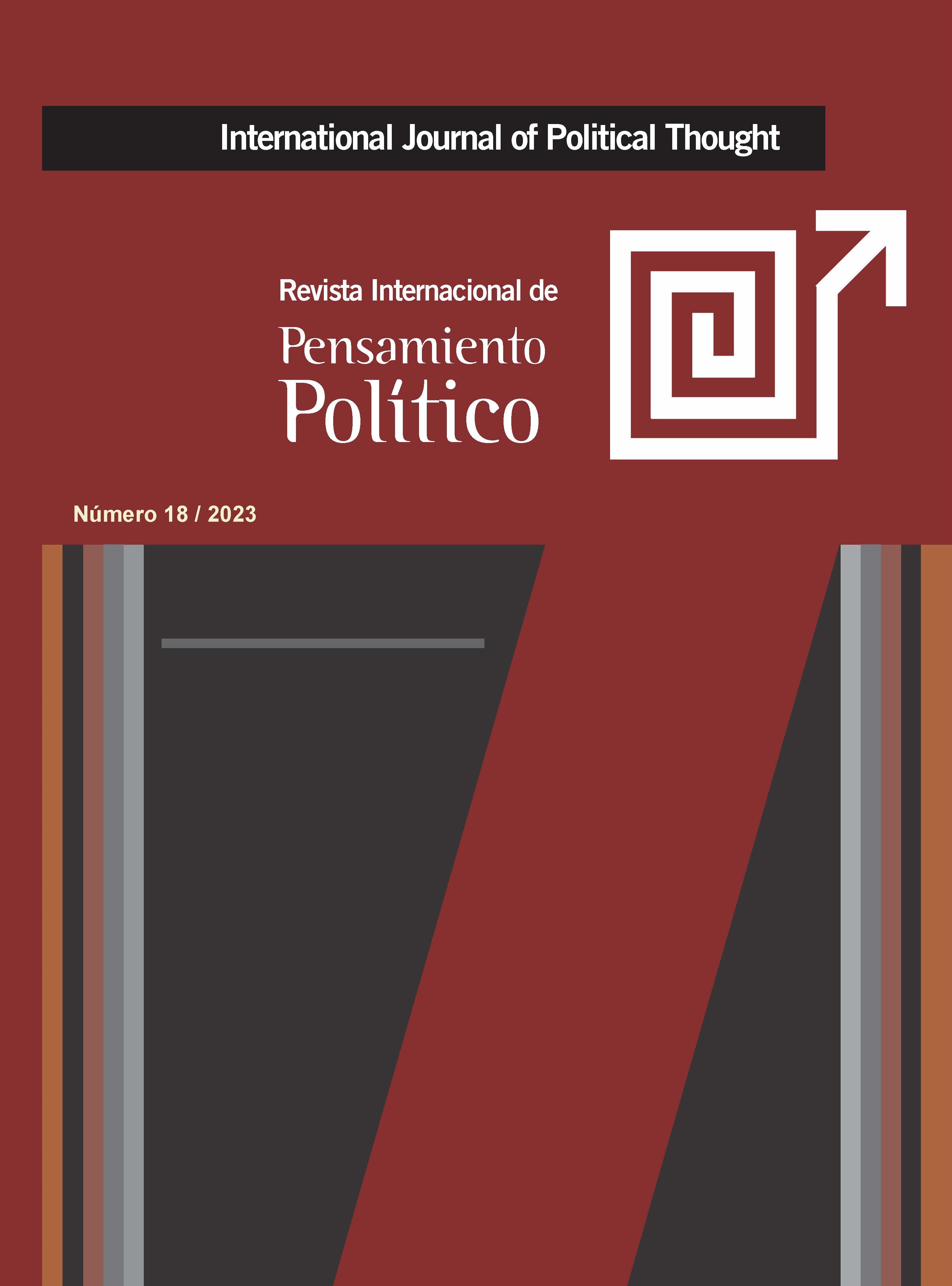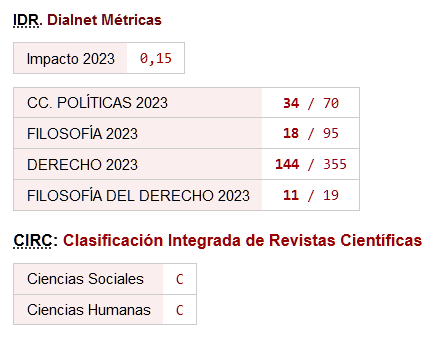Reflections on the “populist reason” and its mythical form of configuration of the people, from the philosophy of Ernst Cassirer
DOI:
https://doi.org/10.46661/revintpensampolit.8038Keywords:
people, populism, sacred, political mythAbstract
In On Populist Reason, Ernesto Laclau reflects on the logic of the formation of collective identities and, in particular, of "the people" as a political category. In this work, the author recognizes the importance of the "metamorphosis of the sacred" in the logic of popular sovereignty of modern democracies and, with it, in populism. The present work aims to analyze the logic of "populist reason", described by Laclau, as a mythical modality of constitution of political subjectivity, based on Ernst Cassirer's reflections on the "political myth". With this, it is intended to shed light on some aspects of the process of sacralization present in the construction of the "popular" identity characteristic of populism, as well as its inherent dangers, in contemporary political life.
Downloads
References
Biglieri, P. y Cadahia, L. (2021). Siete ensayos sobre el populismo. Hacia una perspectiva histórica renovada. Barcelona: Herder.
Boticci, Ch. (2007). A Philosophy of Political Myth. New York: Cambridge University Press. https://doi.org/10.1017/CBO9780511498626 DOI: https://doi.org/10.1017/CBO9780511498626
Box, Z. (2006): "La tesis de la religión política y sus críticos: aproximación a un debate actual", Ayer, 62, pp. 195-230.
Cassirer, E. (2018). "Judaísmo y los mitos políticos modernos", Isegoría. Revista de Filosofía Moral y Política, 59, pp. 391- 407. https://doi.org/10.3989/isegoria.2018.059.02 DOI: https://doi.org/10.3989/isegoria.2018.059.02
Cassirer, E. (1975). "La forma del concepto en el pensamiento mítico", en Esencia y efecto del concepto de símbolo. México: FCE, pp. 7-76.
Cassirer, E. (1975a). "«Lenguaje y mito». Sobre el problema de los nombres de los dioses", en Esencia y efecto del concepto de símbolo. México: FCE, pp. 77-156.
Cassirer, E. (2009). Antropología filosófica: introducción a una filosofía de la cultura. México: FCE.
Cassirer, E. (2013). El mito del Estado. México: FCE.
Cassirer, E. (2013a). Filosofía de las formas simbólicas II: "El pensamiento mítico". México: FCE.
Cassirer, E. (2013b). Filosofía de las formas simbólicas III: "Fenomenología del reconocimiento". México: FCE.
Cassirer, E. (2013c): "Mythic, Aesthetic, and Theoretical Space", en The Warburg Years (1919-1933). Essays on Language, Art, Myth, and Techonology. New Haven-London: Yale University Press, pp. 317-333.
Cassirer, E. (2020). "La técnica de nuestros mitos políticos modernos", en P. Dreizik, P. Ríos Flores y A. Lumerman (eds.). Filosofía, mito y fascismo. Releyendo "El mito del Estado" de Ernst Cassirer. Buenos Aires: RAGIF Ediciones, pp. 21-50.
Critchley, S. (2010). La demanda infinita. La ética del compromiso y la política de la resistencia. Barcelona: Marbot Ediciones.
Critchley, S. (2017). La fe de los que no tienen fe. Experimentos de teología política. Madrid: Trotta.
Errejón, Í. y Mouffe, Ch. (2015). Construir pueblo. Hegemonía y radicalización de la democracia. Barcelona: Icaria.
Favuzzi, P. (2016). "Das Pathos der Vernunf. Cassirers Philosophie zwischen Demokratie und politischem Mythos", en: T. Endres, P. Favuzzi y T. Klattenhoff (eds.). Philosophie der Kulturund Wissensformen. Ernst Cassirer neu lesen. Frankfurt am Main: Peter Lang, pp. 183-211.
Finchelstein, F. (2018). Del fascismo al populismo en la historia. Buenos Aires: Taurus.
Fraser, N. (2021). ¡Contrahegemonía ya! Por un populismo progresista que enfrente al neoliberalismo. Buenos Aires: Siglo XXI.
Gentile, E. (2006). Politics as Religion. Princeton-Oxford: Princeton University Press. https://doi.org/10.1515/9781400827213 DOI: https://doi.org/10.1515/9781400827213
Girard, R. (1983). La violencia y lo sagrado. Barcelona: Anagrama.
Griffin, R. (2008). "Introduction: The Evolutions and Convolutions of Political Religion", en R. Griffin, R. Mallett. y J. Tortotice (coord.). The Sacred in Twentieth-Century Politics. Essays in Honours of Professor Stanley G. Payne. New York, Palgrave- Macmillan, pp. 1-18. https://doi.org/10.1057/9780230241633_1 DOI: https://doi.org/10.1057/9780230241633_1
Klattenhoff, T. y Nordsieck, V. (2020). "El lenguaje político y la indagación del pensamiento mítico. La retórica de la derecha nacionalista desde la perspectiva de la filosofía de la cultura", en P. Dreizik, P. Ríos Flores y A. Lumerman (eds.). Filosofía, mito y fascismo. Releyendo "El mito del Estado" de Ernst Cassirer. Buenos Aires: RAGIF Ediciones, pp. 291-323.
Laclau, E. (2004). "Identidad y hegemonía: el rol de la universalidad en la constitución de lógicas políticas", en Contingencia, hegemonía, universalidad. Diálogos contemporáneos en la izquierda. Buenos Aires: FCE, pp. 49-93.
Laclau, E. (2004a). "Construyendo la universalidad", en Contingencia, hegemonía, universalidad. Diálogos contemporáneos en la izquierda. Buenos Aires: FCE, pp. 281-306.
Laclau, E. (2005). "Populism: What's in a Name?", en F. Panizza (ed.). Populism and the Mirror of Democracy. London- New York: Verso, pp. 32-49.
Laclau, E. (2007). "Universalism, Particularism and the Question of Identity", en Emancipation(s). London- New York: Verso, pp. 20-35.
Laclau, E. (2007a). "Why do Empty Signifiers Matter to Politics?", en Emancipation(s). London- New York: Verso, pp. 36-46.
Laclau, E. (2014). "Lógicas de la construcción política e identidades populares", en J. L. Coraggio y J.-L. Laville (comp.). Reinventar la izquierda en el siglo XXI. Un diálogo Norte-Sur. Buenos Aires: Universidad Nacional de General Sarmiento, pp. 253-265.
Laclau, E. (2021). La razón populista. Buenos Aires: FCE.
Mali, J. (2017). "Un nuevo examen del mito del Estado. Ernst Cassirer y la teoría política moderna", en J. A. Barash (ed.). La construcción simbólica de la realidad: el legado de Ernst Cassirer. Buenos Aires: Prometeo, pp. 157-184.
Moffitt, B. (2022). Populismo. Buenos Aires: Siglo XXI Editores.
Mouffe, Ch. (2005). "The «End of Polities» and the Challenge of Right-wing Populism", en F. Panizza (ed.). Populism and the Mirror of Democracy. London- New York: Verso, pp. 50-71.
Mouffe, Ch. (2007). En torno a lo político. Buenos Aires: FCE.
Mouffe, Ch. (2018). Por un populismo de izquierda. Buenos Aires: Siglo XXI Editores.
Payne, S. (2008). "On the Heuristic Value of the Concept of Political Religion and Its Application", en R. Griffin; R. Mallett y J. Tortotice. The Sacred in Twentieth-Century Politics. Essays in Honours of Professor Stanley G. Payne. New York: Palgrave- Macmillan, pp. 21-35. https://doi.org/10.1057/9780230241633_2 DOI: https://doi.org/10.1057/9780230241633_2
Starke, G. (2016). "Der politische Mythos als Instrument nationalsozialistischer Herrschaft nach Ernst Cassirer", en: T. Endres, P. Favuzzi y T. Klattenhoff (eds.). Philosophie der Kulturund Wissensformen. Ernst Cassirer neu lesen. Frankfurt am Main: Peter Lang, pp. 213-238.
Zanatta, L. (2014). El populismo. Buenos Aires: Katz. https://doi.org/10.2307/j.ctvndv7jj DOI: https://doi.org/10.2307/j.ctvndv7jj
Zizek, S. (2018). Contra la tentación populista. Buenos Aires: Godot.
Downloads
Published
How to Cite
Issue
Section
License
Copyright (c) 2023 Pablo Facundo Ríos Flores

This work is licensed under a Creative Commons Attribution-NonCommercial-ShareAlike 4.0 International License.
Open access policy
Free and open access is allowed to any interested party to all the contents of the journal issues, free of charge, being able to print and transfer all the articles, with the only condition of specifying the source and authorship.
The journal: a) does not charge authorship costs for the processing of articles or for their submission, b) maintains copyright for authors without restrictions, c) facilitates authors to keep their publication rights without limitations.
The International Journal of Political Thought is an original work of the Laboratory of Political Ideas and Practices of the Pablo de Olavide University. All articles included in the Journal are original work of their respective authors. This Journal is freely offered to the scientific and academic community at no cost and releases the contents according to the license "Attribution-NonCommercial-ShareAlike 4.0 CC BY-NC-SA" of the Creative Commons project available in the following url: https://creativecommons.org/licenses/by-nc-sa/4.0/legalcode
If you wish to translate or compile any of the articles available here, please contact us at contacto












 ISSN: 1885-589X
ISSN: 1885-589X  Universidad Pablo de Olavide
Universidad Pablo de Olavide